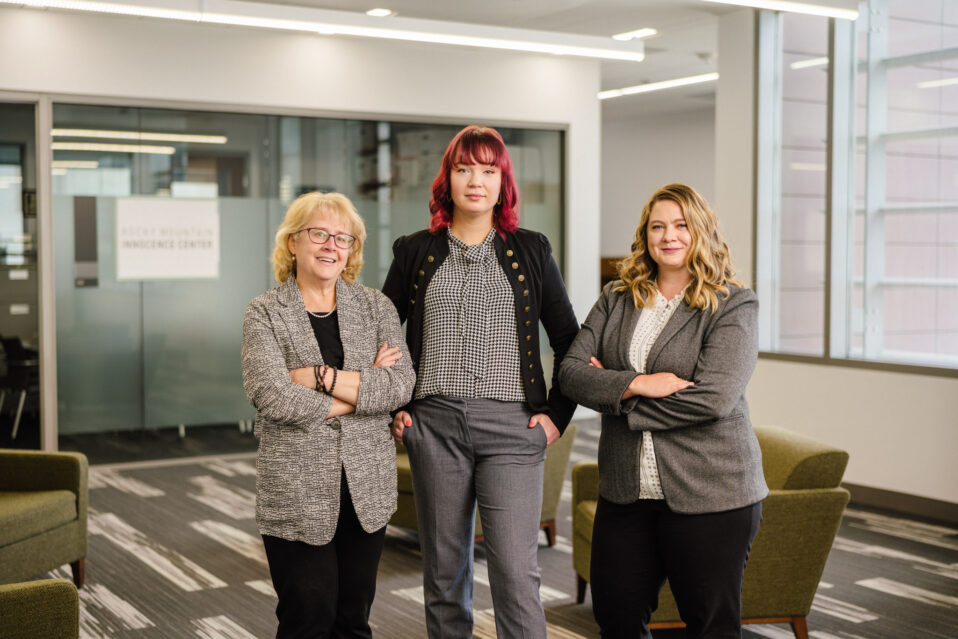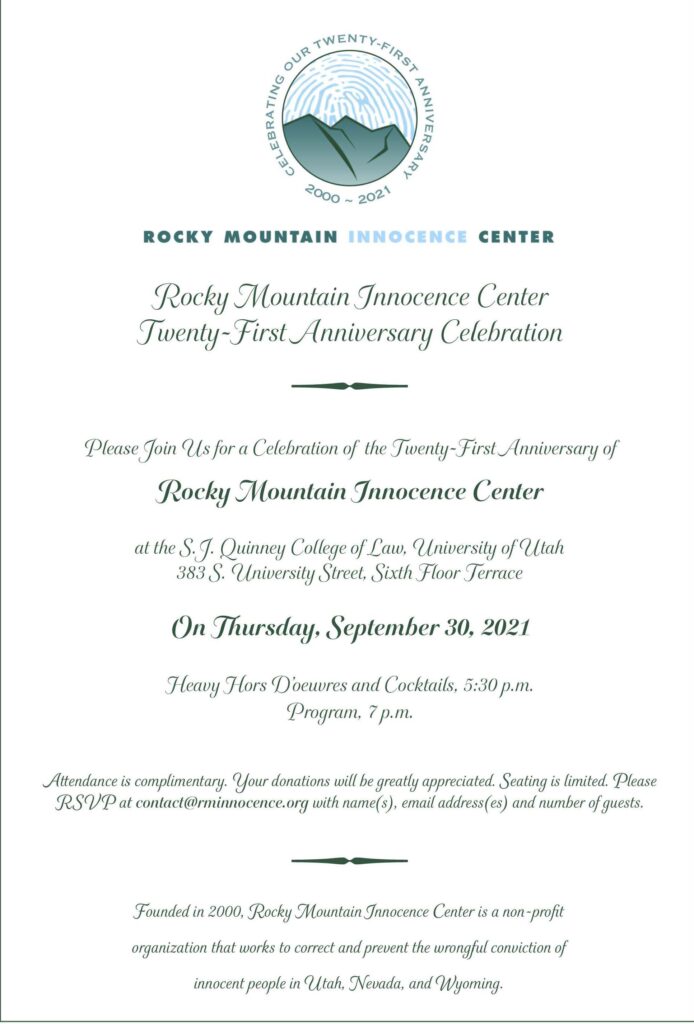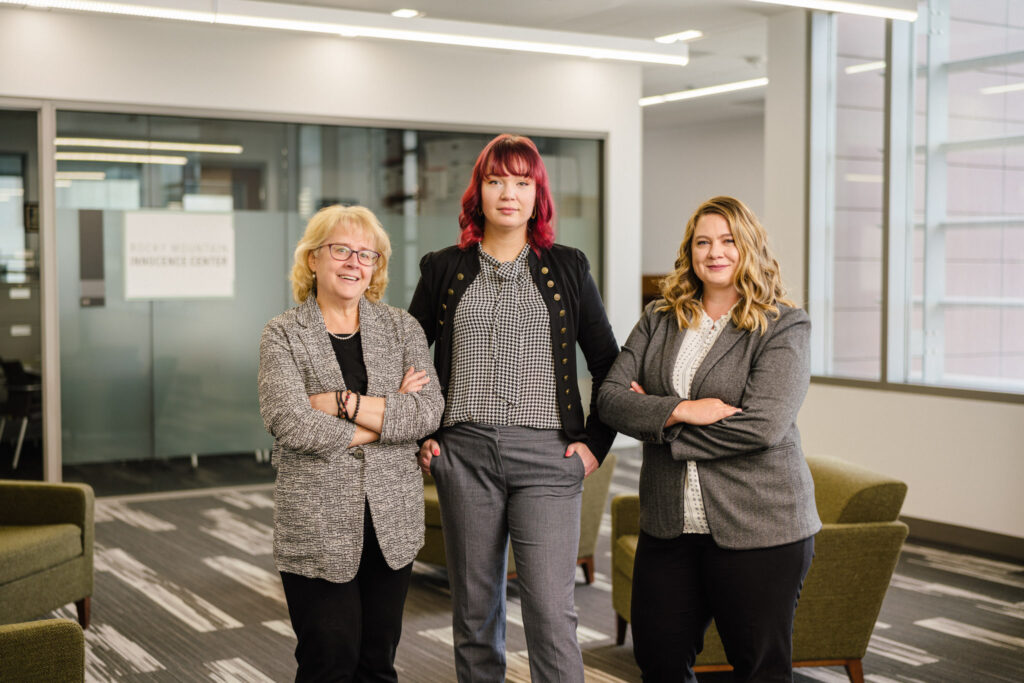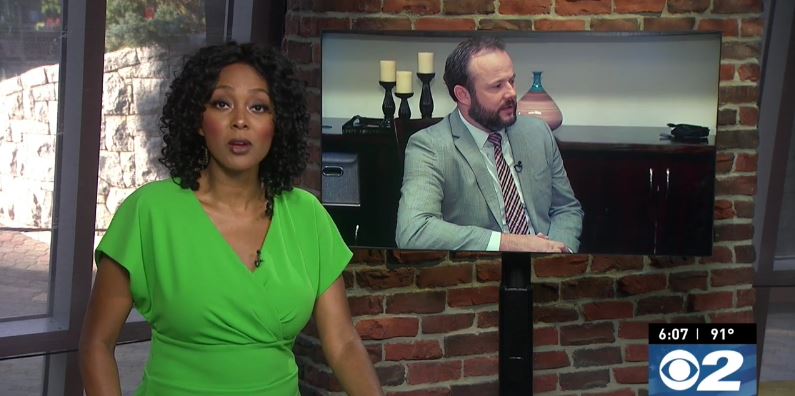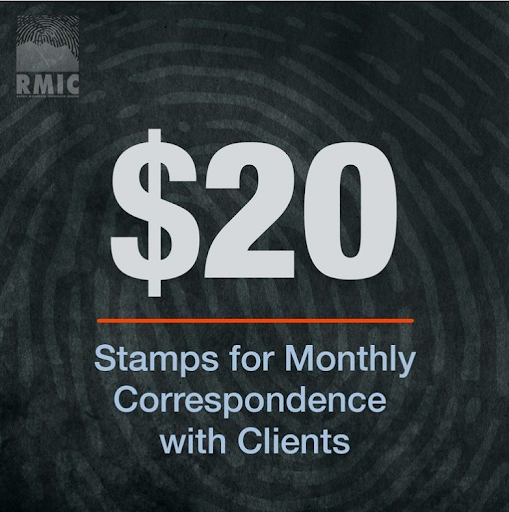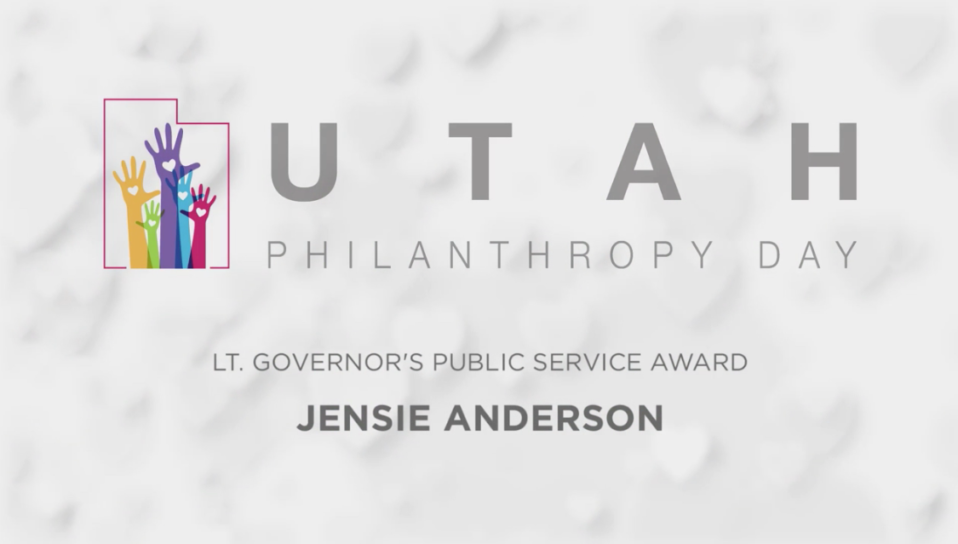Dear Friends of RMIC:
Since 2000, the Rocky Mountain Innocence Center has been working hard in pursuit of our mission to prevent and correct wrongful convictions in the states of Utah, Nevada, and Wyoming. This mission has guided our work through this last year, and we have remained steadfast through 2022 with that in mind.
I am happy to share with you some of the changes and accomplishments from this year!
Organization Updates:
 I was selected by RMIC’s Executive Committee as the new Executive Director in June, and shortly thereafter, we moved our offices from the University of Utah to downtown Salt Lake City. We have made many new friends and met amazing neighbors down here!
I was selected by RMIC’s Executive Committee as the new Executive Director in June, and shortly thereafter, we moved our offices from the University of Utah to downtown Salt Lake City. We have made many new friends and met amazing neighbors down here!
We also added to our Board, including our new Board President, Kurt London, of Swapp & Associates, who previously served as a clinic student and Legal Fellow at RMIC; Allison Blais of Adobe Inc.; private practitioners Jonny Jemming and James Lee, and ClydeSnow Associate Attorney Katey Pepin.
Case Successes:
Most COVID restrictions have been lifted, allowing our Managing Attorney, Jennifer Springer, and Legal Fellow, Amanda Darcy, to return to client visits, witness interviews, and travel for our cases.
This year, RMIC received two favorable Nevada Supreme Court decisions, including a remand for DNA testing and a remand in another case for an evidentiary hearing based on the court’s interpretation of the recently-enacted Factual Innocence statute that we helped pass with the assistance of our exoneree DeMarlo Berry. We look forward to substantial, continued litigation in each of these cases.
Client Successes:
 Our clients have also experienced great successes this year, including Michael Thompson, RMIC’s 8th exoneration as of August 30, 2022, when Utah Judge Su Chon found him factually innocent and ordered compensation of nearly $300,000 for the nearly seven years he spent wrongfully incarcerated.
Our clients have also experienced great successes this year, including Michael Thompson, RMIC’s 8th exoneration as of August 30, 2022, when Utah Judge Su Chon found him factually innocent and ordered compensation of nearly $300,000 for the nearly seven years he spent wrongfully incarcerated.
Mr. Thompson was convicted of two felony offenses in Utah, which he was unable to commit because he was not physically present in the state at the time the offenses occurred.
This year we also have three clients that have been or are about to be paroled, all of which were incarcerated for more than twenty years, two of which RMIC, specifically our Managing Attorney Jennifer Springer, worked tirelessly and successfully to advocate for their release.
Legislative Successes:
In the prevention component of our mission, we were a part of the successful passing of an evidence-preservation bill that took effect this Summer that will require all physical evidence be preserved for the duration of an individual’s incarceration so that possible exculpatory evidence that could be obtained through DNA will be available for testing.
Historically, there was no obligation by state agencies or actors in criminal cases – post-conviction – to keep that evidence. In fact, it was usually destroyed, thereby preventing wrongfully convicted individuals from obtaining DNA testing to establish their innocence. This is a huge success!

Wrongful Conviction Day Fundraiser
RMIC celebrated Wrongful Conviction Day on September 29th in a hugely successful event at The Leonardo. We were joined by many friends and supporters, old and new, and we welcomed exoneree Dean Gillispie to speak to our guests, along with Emmy-award winning journalist Sammy Linebaugh.
I hope to see you all again at our celebration next year! Every time you attend one of our events, donate to RMIC, or share one of our stories with friends or on social media, you push our fight forward and bring us that much closer to getting our clients home.
Donate to RMIC this Holiday Season
Beginning this Giving Tuesday, November 29, 2022, and through the rest of the year, consider making a tax-deductible donation to RMIC. Your donation helps us pay for things, such as expert fees, DNA testing, prison visits, and the many other costs of investigating and litigating on behalf of wrongfully convicted individuals in Utah, Nevada, and Wyoming, and it also allows us to continue to address the systemic problems in the criminal legal system.
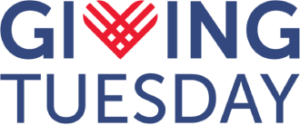 We currently have 50 cases that are in active litigation or investigation, and we receive 15-25 requests for assistance each month. With your donation, we can help free those innocent clients waiting to prove their innocence. With your help, we can continue the fight and bring our clients home to their family and loved ones. You can help make a difference in the lives of the innocent. Simply click the “Donate” button below or send a check to: Rocky Mountain Innocence Center, 358 South 700 East, B235, Salt Lake City, Utah, 84102.
We currently have 50 cases that are in active litigation or investigation, and we receive 15-25 requests for assistance each month. With your donation, we can help free those innocent clients waiting to prove their innocence. With your help, we can continue the fight and bring our clients home to their family and loved ones. You can help make a difference in the lives of the innocent. Simply click the “Donate” button below or send a check to: Rocky Mountain Innocence Center, 358 South 700 East, B235, Salt Lake City, Utah, 84102.
Donate Now

Have a wonderful holiday season with your family and friends and stay tuned for more great things to come from your friends here at the Rocky Mountain Innocence Center.

Kristy Columbia
EXECUTIVE DIRECTOR











 I was selected by RMIC’s Executive Committee as the new Executive Director in June, and shortly thereafter, we moved our offices from the University of Utah to downtown Salt Lake City. We have made many new friends and met amazing neighbors down here!
I was selected by RMIC’s Executive Committee as the new Executive Director in June, and shortly thereafter, we moved our offices from the University of Utah to downtown Salt Lake City. We have made many new friends and met amazing neighbors down here! Our clients have also experienced great successes this year, including Michael Thompson, RMIC’s 8th exoneration as of August 30, 2022, when Utah Judge Su Chon found him factually innocent and ordered compensation of nearly $300,000 for the nearly seven years he spent wrongfully incarcerated.
Our clients have also experienced great successes this year, including Michael Thompson, RMIC’s 8th exoneration as of August 30, 2022, when Utah Judge Su Chon found him factually innocent and ordered compensation of nearly $300,000 for the nearly seven years he spent wrongfully incarcerated.
 We currently have 50 cases that are in active litigation or investigation, and we receive 15-25 requests for assistance each month. With your donation, we can help free those innocent clients waiting to prove their innocence. With your help, we can continue the fight and bring our clients home to their family and loved ones. You can help make a difference in the lives of the innocent. Simply click the “Donate” button below or send a check to: Rocky Mountain Innocence Center, 358 South 700 East, B235, Salt Lake City, Utah, 84102.
We currently have 50 cases that are in active litigation or investigation, and we receive 15-25 requests for assistance each month. With your donation, we can help free those innocent clients waiting to prove their innocence. With your help, we can continue the fight and bring our clients home to their family and loved ones. You can help make a difference in the lives of the innocent. Simply click the “Donate” button below or send a check to: Rocky Mountain Innocence Center, 358 South 700 East, B235, Salt Lake City, Utah, 84102.

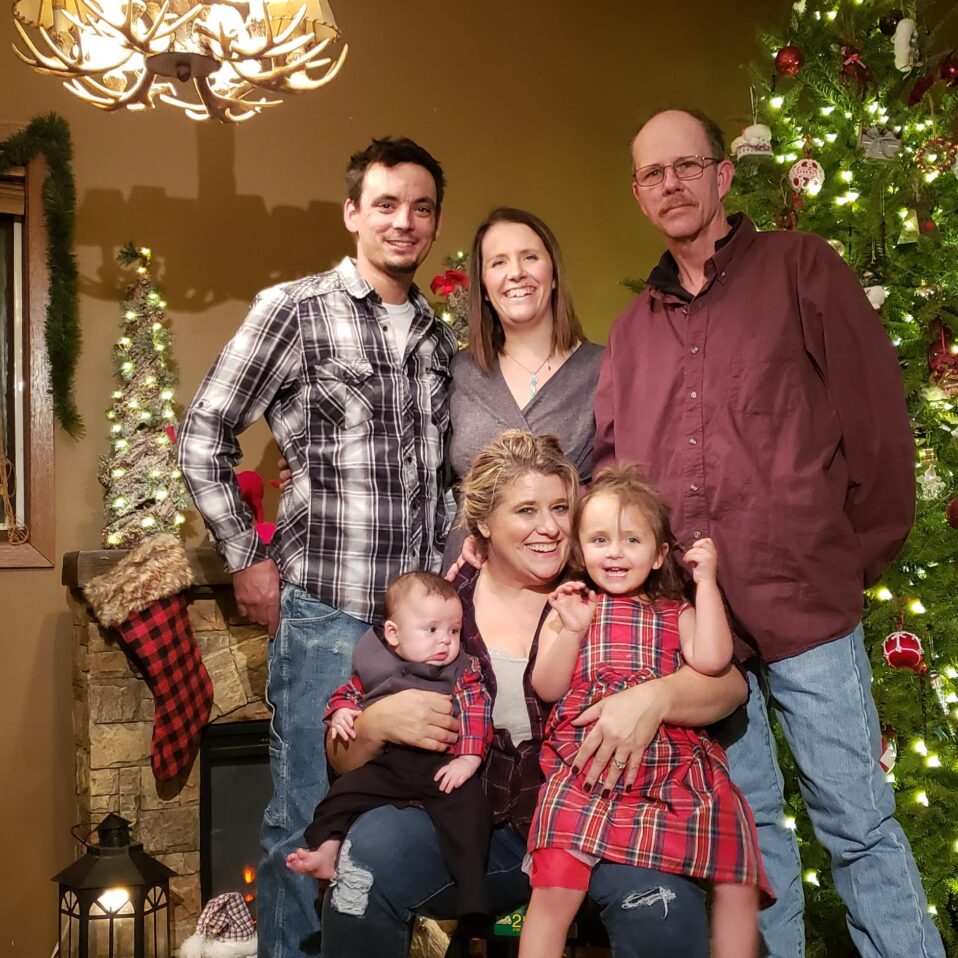
 “This is an amazing feeling. After 20 years, our family is finally free from this nightmare. They say the wheels of justice are slow, and that is the truth, but thank the Lord above. We had some amazing people in our corner to help us fight this injustice to the end. We can’t say ‘Thank You’ enough to all of our family and friends that fought alongside of us. Thank you to: the Rocky Mountain Innocence Center – they are truly there to help right the wrongs of those that have been wrongfully convicted; the amazing dedication from everyone at Parr Brown Gee & Loveless attorneys for all the hours of selfless dedication to our family to make sure Michael’s name was cleared is beyond amazing; Jensie Anderson, you have been through it all with us. You are a gift sent from the heavens to us!
“This is an amazing feeling. After 20 years, our family is finally free from this nightmare. They say the wheels of justice are slow, and that is the truth, but thank the Lord above. We had some amazing people in our corner to help us fight this injustice to the end. We can’t say ‘Thank You’ enough to all of our family and friends that fought alongside of us. Thank you to: the Rocky Mountain Innocence Center – they are truly there to help right the wrongs of those that have been wrongfully convicted; the amazing dedication from everyone at Parr Brown Gee & Loveless attorneys for all the hours of selfless dedication to our family to make sure Michael’s name was cleared is beyond amazing; Jensie Anderson, you have been through it all with us. You are a gift sent from the heavens to us!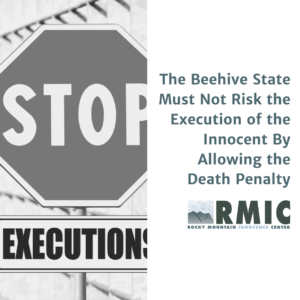 There are situations where convictions are overturned, and nobody should ever be wrongfully imprisoned. Recently, an article was featured in Desert News. Written by Jensie Anderson, the legal director of the Rocky Mountain Innocence Project (RMIC), the article shines a light on the dangers of wrongful convictions. According to the
There are situations where convictions are overturned, and nobody should ever be wrongfully imprisoned. Recently, an article was featured in Desert News. Written by Jensie Anderson, the legal director of the Rocky Mountain Innocence Project (RMIC), the article shines a light on the dangers of wrongful convictions. According to the

 In honor of Wrongful Conviction Day, all donations to RMIC will be matched up to $100,000, thanks to the generosity of the Florence J Gillmor Foundation.
In honor of Wrongful Conviction Day, all donations to RMIC will be matched up to $100,000, thanks to the generosity of the Florence J Gillmor Foundation.